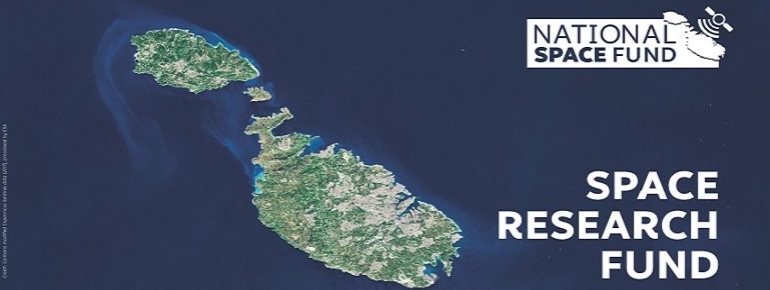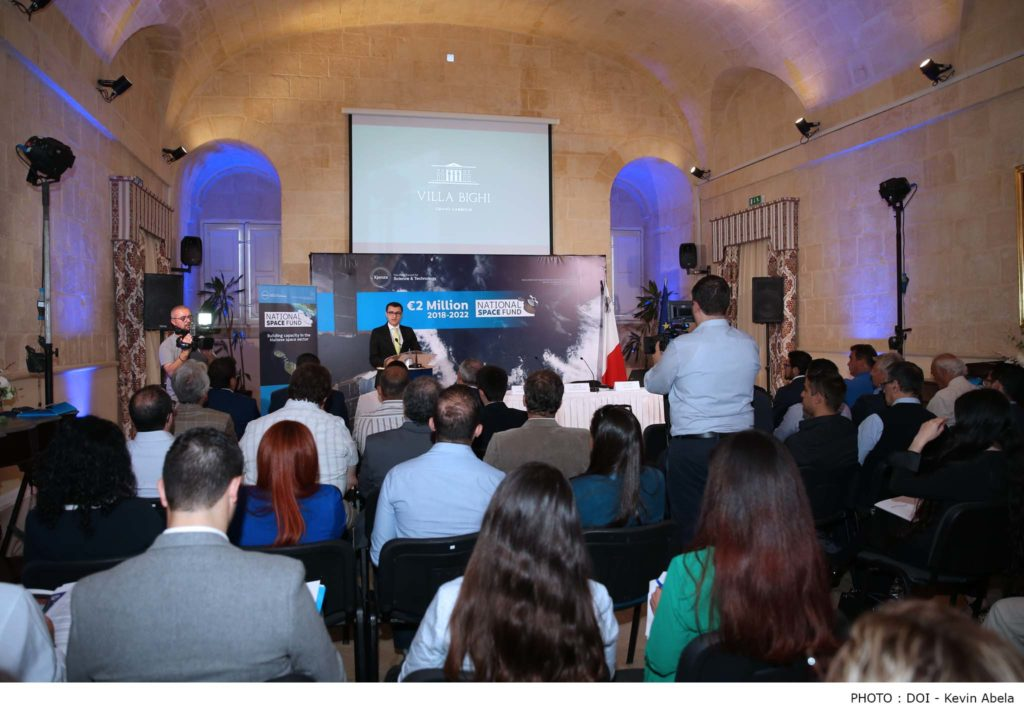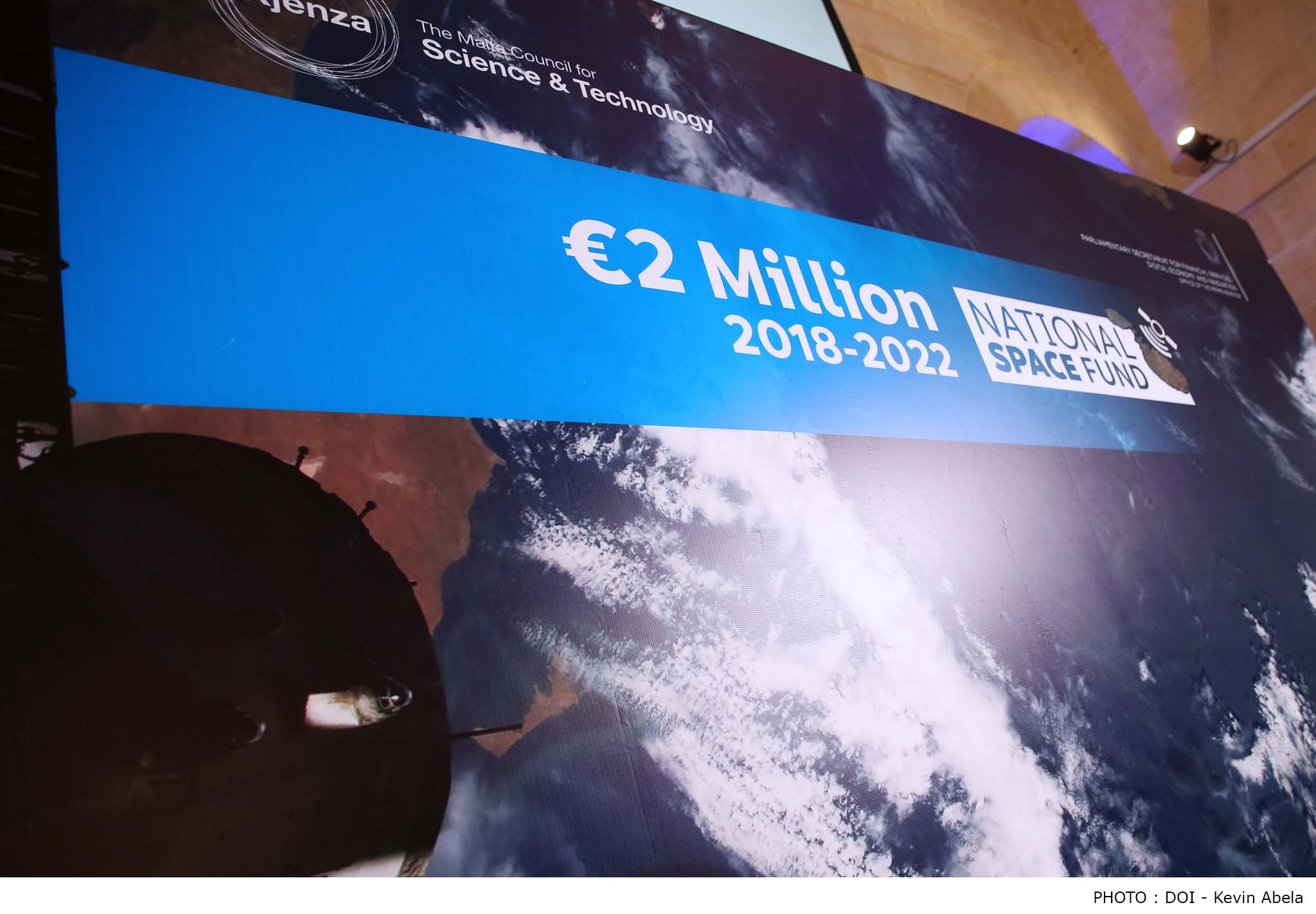Boosting Malta’s space sector, insights into the nation’s €2 million National Space Fund

The European Union’s (EU) Copernicus Earth Observation programme, with its associated free and open data policies, intends to service the data-driven digital transformation of our daily lives. The Sentinel satellites monitor planet Earth 24/7, delivering hundreds of terabytes of raw data expected to fuel applications in agriculture, forestry, blue economy, renewable and many more. The programme came with an impressive price tag in public funding, with the overall investments currently being estimated at €7.8 billion EUR (1998-2020). In return, the EU expects Copernicus to generate €67 to €131 billion in benefits for the European society by 2035. An economic return,10 to 20 times the cost of investment.
To turn such predictions into reality, Copernicus needs two critical elements (1) an appropriate market demand and (2) a critical mass of consumers for its ever-growing amounts of data. Be it public or private, demand is quintessential when it comes to generating economic growth. Earth Observation (EO) and remote sensing data themselves are more often than not, inconsequential in their own right. It is how we make use of such data that allows us to fully exploit its value and potential to improve decision making capabilities. Whether it is exploited to secure our coastal waters or mitigate climate change risks, access to terabytes of information is not enough. When such information is incomprehensible to policymakers and legislators, or they are simply not aware of it, the uptake and use of EO based services remains patchy and low. Moreover, the use of EO based services varies greatly across EU member states, with substantial differences in users between countries with historical space capabilities and non-space focused economies.
Building a market, creating demand and generating awareness are not easy linear 1-2-3 processes, as most marketing experts might tell you. So how can we lay the foundations to foster market demand in countries with limited space capacities? Our members at the Malta Council for Science and Technology provided us with a potential best practice scenario.
 Malta’s journey towards a national space sector started in 2012 with the Malta-ESA Cooperation agreement. The first Maltese National Space Policy followed in 2017, recognising the need to harvest the potential of space data to deliver smarter services across a number of thematic areas. Most importantly, the policy highlights that space should not be viewed in isolation but rather, as a tool that substantiates more traditional methodologies in various sectors. Space data is a cross cutting subject. It is an enabler. Just like ICT, it is no longer a luxury, but a necessity. As such, MCST seeks to generate a critical mass in the downstream space sector as it keeps the country’s smart specialisation sectors in mind. Respectively, building on Malta’s flourishing Information and Communication Technology (ICT) sector, aerospace, aquaculture and maritime services, amongst other sectors.
Malta’s journey towards a national space sector started in 2012 with the Malta-ESA Cooperation agreement. The first Maltese National Space Policy followed in 2017, recognising the need to harvest the potential of space data to deliver smarter services across a number of thematic areas. Most importantly, the policy highlights that space should not be viewed in isolation but rather, as a tool that substantiates more traditional methodologies in various sectors. Space data is a cross cutting subject. It is an enabler. Just like ICT, it is no longer a luxury, but a necessity. As such, MCST seeks to generate a critical mass in the downstream space sector as it keeps the country’s smart specialisation sectors in mind. Respectively, building on Malta’s flourishing Information and Communication Technology (ICT) sector, aerospace, aquaculture and maritime services, amongst other sectors.
As a first step towards raising awareness and build capacity, MCST recognised that as with many nations with limited space economies, numerous misconceptions exist around the term ‘space’. In addition, as part of these inaccurate perceptions on what comprises a space sector, there is a lack of understanding on the availability, accessibility and resourcefulness of EO space data. MCST set up a €2 million Euros National Space Fund that seeks to target such misnomers and bridge the gap between space and society on multiple fronts. Following a targeted approach towards building capacity, the fund has been set up to compliment other dissemination tools, such as Copernicus Info Days, App Challenges and hands-on trainings.
 Covering two priority areas, a Space Research Fund and a Space Education Programme, the National Space Fund runs between 2018 and 2022. The Space Education Programme targets the younger generation, enabling Maltese primary and secondary school students to participate in interactive activities that introduce them to the notion that ‘space’ goes beyond rocketry and planetary studies. On the other hand, the Space Research Fund focuses on today’s professionals: the potential operational users in Governmental sectors and private entities that seek diversifying their portfolio of services. The programme, which is open to any Maltese undertaking, provides financial support for research, development and innovation in the downstream satellite EO sector. The research programme operates on yearly calls supporting 20-month projects up to a maximum of €150,000 per project.
Covering two priority areas, a Space Research Fund and a Space Education Programme, the National Space Fund runs between 2018 and 2022. The Space Education Programme targets the younger generation, enabling Maltese primary and secondary school students to participate in interactive activities that introduce them to the notion that ‘space’ goes beyond rocketry and planetary studies. On the other hand, the Space Research Fund focuses on today’s professionals: the potential operational users in Governmental sectors and private entities that seek diversifying their portfolio of services. The programme, which is open to any Maltese undertaking, provides financial support for research, development and innovation in the downstream satellite EO sector. The research programme operates on yearly calls supporting 20-month projects up to a maximum of €150,000 per project.
Following a successful first 2018 edition of the Space Research Fund, MCST shared with us three key takeaways to facilitating the take up of satellite applications in an operational setting:
Understanding your “client”
Knowing your local sector and identifying the current and potential users of Copernicus products and creating a local “mind-map” can help identify cooperation opportunities beforehand. Established contact points within different entities that can act as ambassadors within their respective entities, can be valuable allies when it comes to advocating for alternative solutions (e.g. space-based applications) that substantiate current or traditional methodologies. In addition, peer-to-peer knowledge sharing amongst experts working within entities with similar remits, albeit from different countries, can prove to be more powerful than a company’s sales pitch. This gets us to our second take away:
Cooperating with key entities
In building local expertise, twinning potential national users with foreign experienced ones, can act as a powerful tool. They have similar challenges and use cases and ‘speak the same language’. Any exchange experience, such as working within state-of-the-art establishments surrounded by experts in the field, helps the individual learn to approach the sector with a refreshed mindset. This helps sustain a generation of professionals that are open to consider solutions substantiated by space applications in delivering their services. Moreover, in the long run, this approach helps close knowledge gaps between countries and reduce disparities between established players and emerging ones like Malta.
Go from information to practice
Capacity building in the form of hands-on workshops using real software packages and real datasets to mentor prospective users on how they use the data operationally is key. Moreover, such mentorship cannot stop with the workshop – a structured mentorship or rather “hand-holding”, needs to continue post-workshop to ensure the new data and techniques are actually being used operationally. Open to any Maltese legal entity, public, private, research or academic, the call specifically addresses projects that deal with the processing and exploitation of data collected through Earth Observation satellites.
Following a first 2018 edition, two projects were successfully funded:
- PIXAM, coordinated by the Malta College of Arts, Science and Technology (MCAST) in collaboration with the Ministry for the Environment, Sustainable Development and Climate Change (MESDC): The research seeks to develop deep learning algorithms on Copernicus Sentinel datasets that help depict pixels patterns and aid in better understanding the dynamics of the local habitat. This includes comprehensive mapping of selected crop patterns and soil moisture across agricultural fields and valleys.
- SAT-FIRE “SATellite data Fusion and Imaging Resolution Enhancement for coastal areas”, an interfaculty/ interdisciplinary project in the University of Malta: The main objective of this project is to better approach the spatial resolution challenges posed by current EO satellite systems. This is done by fusing complementary data from different spectral images from Copernicus’ Sentinel-2 and Sentinel-3 data to improve the quality of such imagery in both the spatial and temporal domains. This will allow for more accurate predictions of marine currents, aiding divers, search and rescue operations and coastal monitoring.
The next Space Research Fund call will be open to all Maltese entities in March 2019. More information on this opportunity for funding is available on MCST’s webpage. Prospective applicants wishing to learn more about such opportunities are encouraged to get in touch at space.mcst@gov.mt.
